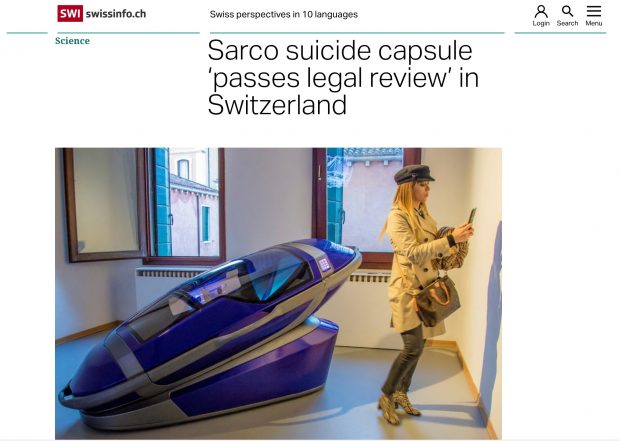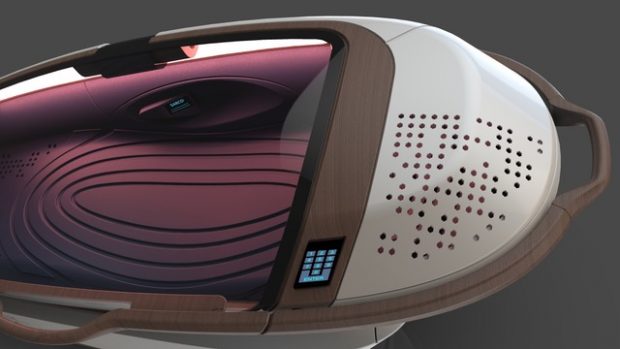December 4, 2021
Sarco suicide capsule ‘passes legal review’ in Switzerland
According to Swiss law experts, the Sarco suicide capsule ‘passes legal review’ in Switzerland.
A 3D-printed capsule, destined for use in assisted suicide, may legally be operated in Switzerland, according to advice obtained by Exit International, the organisation that developed the ‘Sarco’ machine.
Some 1,300 people died by assisted suicide in Switzerland in 2020 using the services of the country’s two largest assisted suicide organisations, Exit (no connection to Exit International) and Dignitas. The method currently in use is ingestion of liquid sodium pentobarbital.
After taking the drug, the person will fall asleep within two to five minutes before slipping into a deep coma, followed soon afterwards by death. Sarco offers a different approach for a peaceful death, without the need for controlled substances.
The Interview
SWI swissinfo.ch spoke to Dr Philip Nitschke, founder of Australia-registered Exit International, about his innovation, the coffin-like Sarco capsule, and what place he expects it will have in the Swiss assisted dying sector.
SWI swissinfo.ch: What is Sarco and how does it work?
Philip Nitschke: It’s a 3-D printed capsule, activated from the inside by the person intending to die. The machine can be towed anywhere for the death. It can be in an idyllic outdoor setting or in the premises of an assisted suicide organisation, for example.
The person will get into the capsule and lie down. It’s very comfortable. They will be asked a number of questions and when they have answered, they may press the button inside the capsule activating the mechanism in their own time.
The capsule is sitting on a piece of equipment that will flood the interior with nitrogen, rapidly reducing the oxygen level to 1 per cent from 21 per cent. The person will feel a little disoriented and may feel slightly euphoric before they lose consciousness. The whole thing takes about 30 seconds. Death takes place through hypoxia and hypocapnia, oxygen and carbon dioxide deprivation, respectively. There is no panic, no choking feeling.
SWI swissinfo.ch: What stage are you at in developing the machine and making it available for use?
P.N.: Last year, we sought senior advice on the legality of using Sarco in Switzerland for assisted dying and were pleased when the Sarco suicide capsule ‘passes legal review’ in Switzerland. This review has been completed and we’re very pleased with the result which found that we hadn’t overlooked anything. There are no legal issues at all.
There are two Sarco prototypes in existence so far, and the third Sarco is now being printed in the Netherlands. If all goes well, the third machine should be ready for operation in Switzerland in 2022.
The first Sarco is being displayed at the Museum for Sepulchral Culture in Kassel, Germany from September 2021 to February 2022. The second turned out not to be aesthetically pleasing. For that and various other reasons it’s not the best one to use.
Several of Sarco’s supplementary projects have been delayed due to the [Covid-19] pandemic. For instance, the development of a camera that allows the person to communicate with the people outside. There needs to be a recording of the person’s informed consent. This has been commissioned and the next step is to get it manufactured.
SWI swissinfo.ch: Your stated goal is to de-medicalise the dying process. What does that entail?
P.N.: Currently a doctor or doctors need to be involved to prescribe the sodium pentobarbital and to confirm the person’s mental capacity. We want to remove any kind of psychiatric review from the process and allow the individual to control the method themselves.
Our aim is to develop an artificial intelligence screening system to establish the person’s mental capacity. Naturally there is a lot of scepticism, especially on the part of psychiatrists. But our original conceptual idea is that the person would do an online test and receive a code to access the Sarco.
SWI swissinfo.ch: You are based in the Netherlands. How will you potentially enter the Swiss market?
P.N.: We have been talking with various groups in Switzerland, including those we have worked with before on individual assisted suicide cases, with a view to providing Sarco for use in the country. This would be in collaboration with a local organisation.
Barring any unforeseen difficulties, we hope to be ready to make Sarco available for use in Switzerland next year. It’s been a very expensive project so far but we think we’re pretty close to implementation now.


